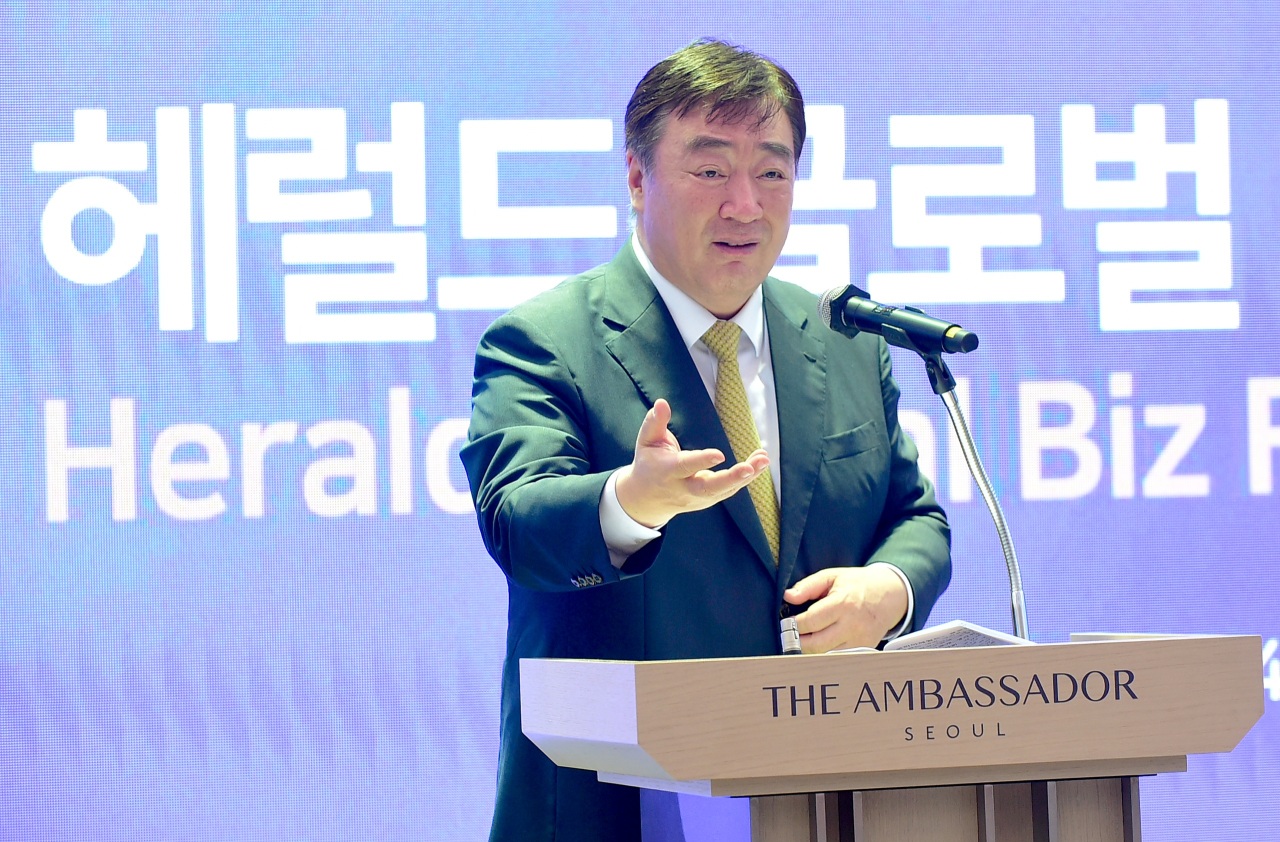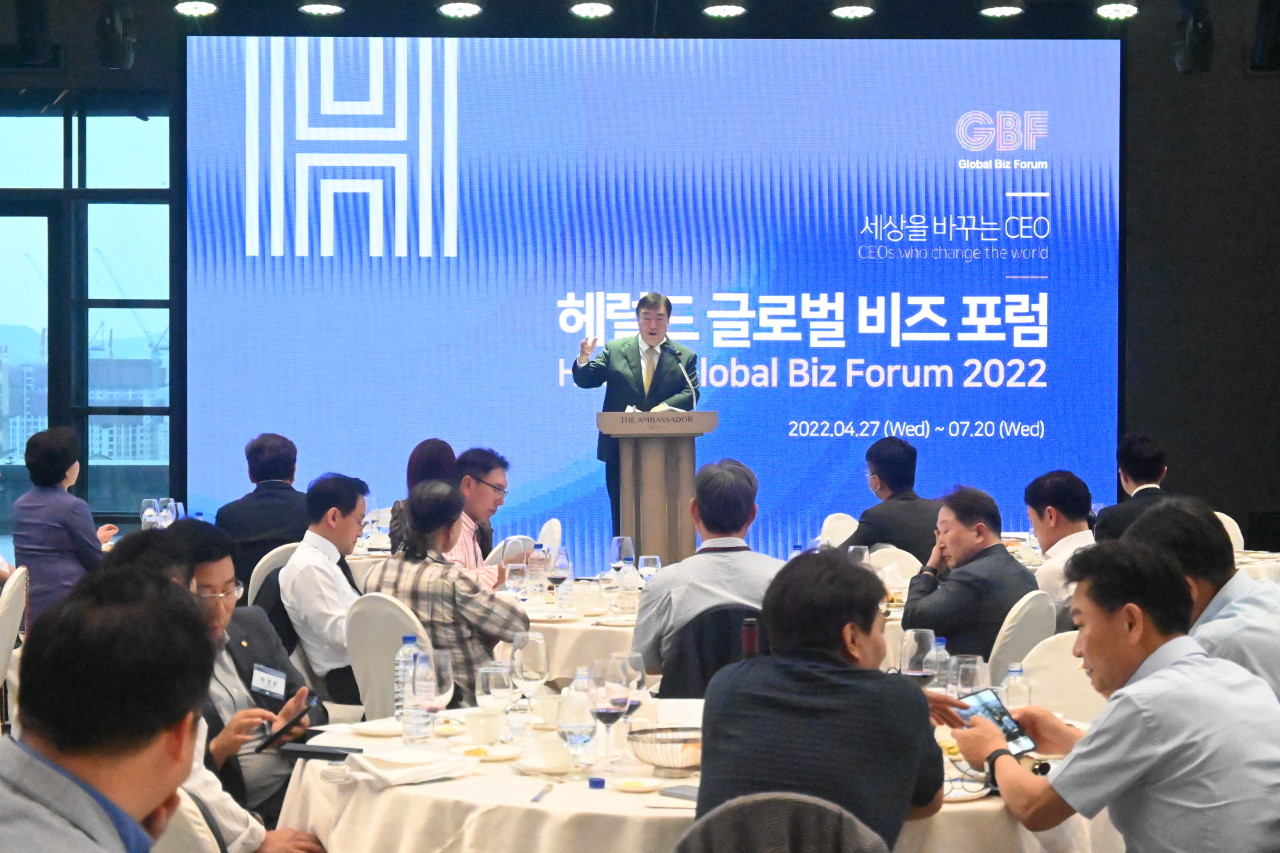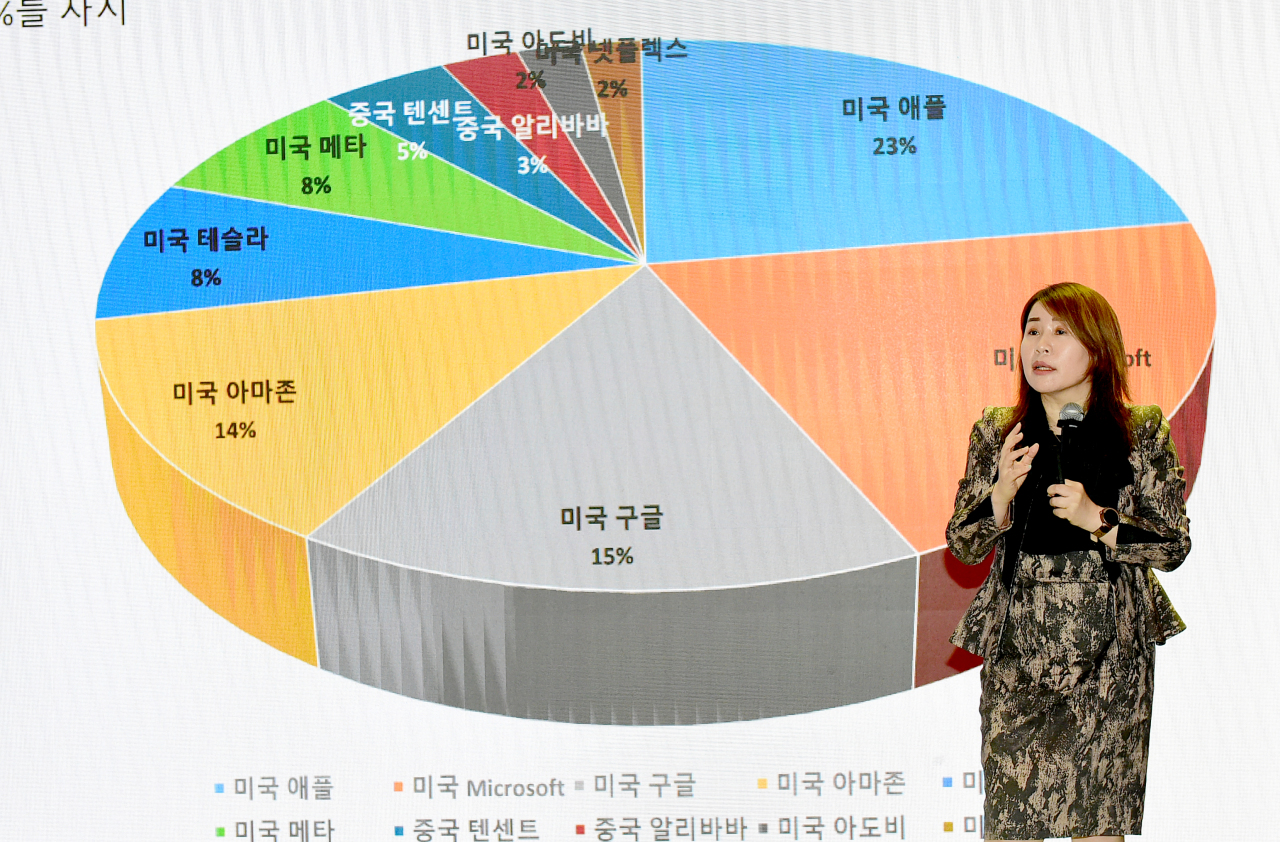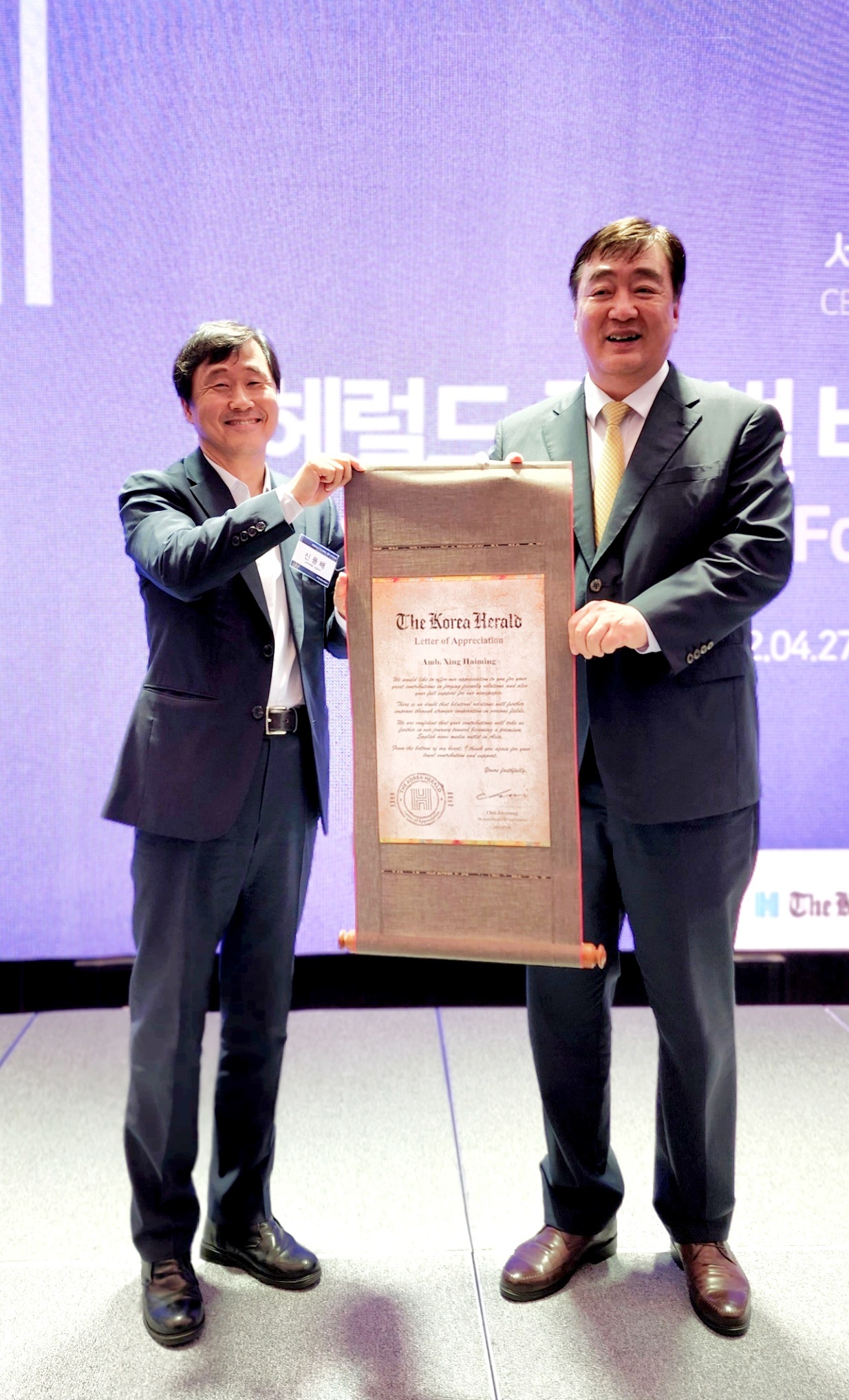
Chinese Ambassador to Korea Xing Hai Ming addresses CEOs at The Korea Herald’s Global Business Forum at the Ambassador Hotel in Seoul, Wednesday.(Jenny Sung)
“Why does Korea need to ‘decouple’ from vibrant China? Decoupling from China is decoupling from future opportunities” Chinese Ambassador to Korea Xing Hai Ming told The Korea Herald at the Global Business Forum on Wednesday in Seoul.
“We must work together to find a solution with an open mind and a whole heart, while respecting and understanding each other,” said Xing, adding that China-Korea relations face external hindrances.
According to Xing, the US is applying every force it can to maintain its absolute hegemony, drawing and oppressing regional countries to disrupt and undermine China‘s relations with neighboring countries, seeing China’s continuous development.
“China-Korea bilateral cooperation in various fields such as politics, economy, and culture (are) affected to some extent due to these factors,” said Xing referring to recent perceptions among some Korean companies about an end to the era of an exports boom through China and the need for Korea to find new ways leaving China.
Xing added, “Reality of this view is to instigate decoupling from China, I think there may be interference from the US behind it.”
“Does Korea have to decouple from China? Is it possible? Assessment criterion lies in the national interest of Korea,” stressed Xing, who also served in the Chinese Embassy in Pyongyang from 1988-1991 and 2006-2008.

Chinese Ambassador to Korea Xing Hai Ming speaks at the second edition of the Global Business Forum hosted by The Korea Herald at the Ambassador Hotel in Seoul, Wednesday.(Sanjay Kumar/The Korea Herald)
Xing cited a recent analysis by a Korean research institute that measured the relevance of economic development between China and Korea since 2008 at 0.56 while between Korea and the US at only 0.054.
The Chinese ambassador acknowledged that Chinese-Korea relations have not gone constantly smoothly, and they have faced hardships due to public sentiment of the US-made Terminal High Altitude Area Defense system being deployed here.
Calling China the only country with a full industrial inventory, a complete set of industries such as automobiles and IT forming a highly integrated industrial cluster and a substantially positioned country in the global industrial and supply chain, Xing underlined that many Korean experts evaluate China is surpassing the US in artificial intelligence, big data and new energy.
According to Xing, some Koreans seem to have a misunderstanding of China‘s new development structure called “dual circulation,” which mutually promotes domestic and international circulation focusing on a huge domestic cycle.
Dual circulation is a Chinese government strategy that focuses on cutting China’s dependence on overseas markets and technology for the country’s long-term development.
“Potential for consumer demand in China is still huge,” he said, highlighting that focus on domestic circulation does not refer to “self-reliance” and also does not constitute a national blockade.
China’s population numbers 1.4 billion, with its middle class alone exceeding 400 million, and consumption of 39 percent of gross domestic product in 2017 , much lower than that of the United States, and lower than Japan, South Korea and even India, Xing said, citing statistics.
According to Xing, a dual circulation structure would take advantage of China’s potential for domestic demand and facilitate domestic and international market links for comprehensive growth.
“It is to realize a higher level of reform and opening up through supply-side structural reform,” he said, adding if incentives for economic development in China are somewhat reduced, it is only referred to as incentives of early economic growth in the past.
Incentives for quality development of the Chinese economy have just started to emerge, according to Xing.
Under the dual circulation structure, China would see itself upgraded from a global supply center to a dual center of supply and demand, said Xing.
“This will provide more opportunities for foreign companies to enter the Chinese market,” he said.
Ruling out concerns that China‘s Zero-COVID policy would affect economic development, Xing underlined that China is safeguarding the prevention of COVID-19, economic and social development as a whole by putting people and lives first, and protecting people’s lives and health to the maximum.
“China has relaxed a lot of visa and entry quarantine policies,” highlighted the ambassador.
He said that China‘s economic growth rate was 4.8 percent in the first quarter of this year, ranking top among major economies and committed to strengthening the coordination of macroeconomic policies, implementing effective measures, and achieving annual economic and social development goals.
According to Xing, the 20th National Congress of the Chinese Communist Party to be held in Beijing in the second half of 2022 is to lay the blueprint for China’s next stage of development.
“China will continue to create a marketized, legalized and internationalized business environment,” said Xing, stressing efforts to raise China’s level of openness to the world.

Ahn Yu-hwa, a professor of finance at Sungkyunkwan University‘s Graduate School of Chinese Studies, delivers a lecture on changes in global supply chains and directions of Korea-China cooperation at The Korea Herald’s Global Business Forum at the Ambassador Hotel in Seoul, Wednesday.(Jenny Sung)
Xing said that China-Korea economic and trade cooperation are complementary to one another and industrial and supply chains are deeply connected. The ambassador invited Korean companies to share China‘s development incentives by participating in the establishment of China’s dual circulation development structure and a higher level of the open economic system.
Emphasizing the significance of interdependence in the world today, the ambassador pointed out that some countries are trying to achieve absolute security by expanding military alliances and adhering to a Cold War mindset and power politics.
“They are intimidating to create camp confrontation by using allies and self-righteously ignoring interests of other countries.
“If we follow this dangerous trend, the world will inevitably become more unstable,” Xing said.
“In difficult times, we need to preserve common Oriental values, true international order and multilateralism.”
According to Xing, China seeks to fortify strategic communication, deepen reciprocity and coexistence and promote people-to-people exchanges.
“China wants to create opportunities and solve difficult problems with openness and cooperation,” he said, adding China hopes to bring a better future for the people of both countries and the world by promoting qualitative upgrades and the stable, long-term development of China-Korea relations.
China and Korea are neighbors that have looked at each other as into a mirror, depended on each other to create a dazzling Oriental civilization attaining Oriental values of putting the country first and getting along well with neighbors, and based on these common values, China and Korea worked and walked together, said Xing, who has worked at the Chinese Embassy in Seoul for some 10 years.

The Korea Herald Vice President Shin Yong-bae (left) presents a letter of appreciation to Chinese Ambassador to Korea Xing Hai Ming at the second session of The Korea Herald’s Global Business Forum at the Ambassador Hotel in Seoul, Wednesday. (Jenny Sung)
“Through this, we achieved national independence, national liberation and an economic leap forward,” he said, underlining the rapid development of 30 years of China-Korea diplomatic ties.
“Bilateral trade increased more than 50 times over the last 30 years,” said the ambassador, referring to China as Korea‘s largest trading partner for 18 years.
He said that China-Korea trade exceeded $360 billion, close to the level of combined trade of Korea with the US, Japan and the EU.
“China-Korea mutual investment also reached a record high of $100 billion,” he highlighted, hoping for Korea to overtake Japan this year to become China’s second-largest trading partner.
“More than 200 sisterhood ties between local cities were forged,” he underlined, applauding China-Korea people-to-people exchanges that hit 10 million people a year.
“People-to-people exchanges are expected to increase hugely after the end of COVID-19,” he added, noting the fundamental interests of the Chinese and Korean people promote regional stability and prosperity.




![[AtoZ into Korean mind] Humor in Korea: Navigating the line between what's funny and not](http://res.heraldm.com/phpwas/restmb_idxmake.php?idx=645&simg=/content/image/2024/04/22/20240422050642_0.jpg&u=)


![[Exclusive] Korean military set to ban iPhones over 'security' concerns](http://res.heraldm.com/phpwas/restmb_idxmake.php?idx=645&simg=/content/image/2024/04/23/20240423050599_0.jpg&u=20240423183955)
![[Herald Interview] Why Toss invited hackers to penetrate its system](http://res.heraldm.com/phpwas/restmb_idxmake.php?idx=645&simg=/content/image/2024/04/22/20240422050569_0.jpg&u=20240422150649)
![[Graphic News] 77% of young Koreans still financially dependent](http://res.heraldm.com/phpwas/restmb_idxmake.php?idx=645&simg=/content/image/2024/04/22/20240422050762_0.gif&u=)